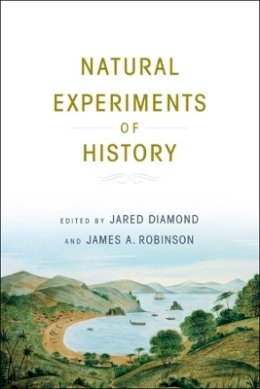
Natural Experiments of History
Jared Diamond
Some central questions in the natural and social sciences can't be answered by controlled laboratory experiments, often considered to be the hallmark of the scientific method. This impossibility holds for any science concerned with the past. In addition, many manipulative experiments, while possible, would be considered immoral or illegal. One has to devise other methods of observing, describing, and explaining the world.
In the historical disciplines, a fruitful approach has been to use natural experiments or the comparative method. This book consists of eight comparative studies drawn from history, archeology, economics, economic history, geography, and political science. The studies cover a spectrum of approaches, ranging from a non-quantitative narrative style in the early chapters to quantitative statistical analyses in the later chapters. The studies range from a simple two-way comparison of Haiti and the Dominican Republic, which share the island of Hispaniola, to comparisons of 81 Pacific islands and 233 areas of India. The societies discussed are contemporary ones, literate societies of recent centuries, and non-literate past societies. Geographically, they include the United States, Mexico, Brazil, western Europe, tropical Africa, India, Siberia, Australia, New Zealand, and other Pacific islands.
In an Afterword, the editors discuss how to cope with methodological problems common to these and other natural experiments of history.
Product Details
About Jared Diamond
Reviews for Natural Experiments of History
John Coatsworth, Columbia University Natural Experiments of History reaches across a wide variety of disciplines, in ways that should be accessible to just about every educated reader. It is tied together not by topic or region but by the idea that we can make useful and insightful comparisons in ways that are not casual or sloppy, but actually contribute to our understanding of human life.
Jeffry Frieden, Harvard University Natural Experiments of History is a short book packed with huge ideas. Its collected essays advocate how controlled experiments can be applied to the messy realities of human history, politics, culture, economics and the environment. It demonstrates productive interdisciplinary collaborations but also reveals gulfs between different cultures of academia...All of the essays in Natural Experiments of History will trigger debate.
Jon Christensen
Nature
This ambitious, at times challenging, book aspires to contribute new ways of historical thinking and historical research by drawing attention, on the one hand, to the similarities between science (including social sciences) and history, and on the other, by using social sciences methods, especially statistical analysis, to study history. The editors argue that though the difference between studies of nature and human history is obvious, there are clear overlaps. They can be viewed through studying comparative history or by conducting "natural experiments of history" and analyzing the "perturbations" and their causes (exogenous or endogenous) in the involved cases. The book offers a broad array of case studies to illustrate and explain the argument, ranging from nonliterate to contemporary societies and from the U.S., Canada, and Mexico to Brazil, India, and tropical Africa. The comparative methods showcased are quite versatile, from two-way to multiple-way comparisons. All the case studies are interesting and help demonstrate how, via comparative study, one society's, region's, or country's situation is better displayed and explained by juxtaposing it with other, similar ones. A useful read in macro, global history.
Q. E. Wang
Choice
Natural Experiments of History is a thought-provoking collection of essays that covers an impressive array of topics and would make an excellent text for a course on comparative studies of human history."
Thomas E. Currie
Cliodynamics
